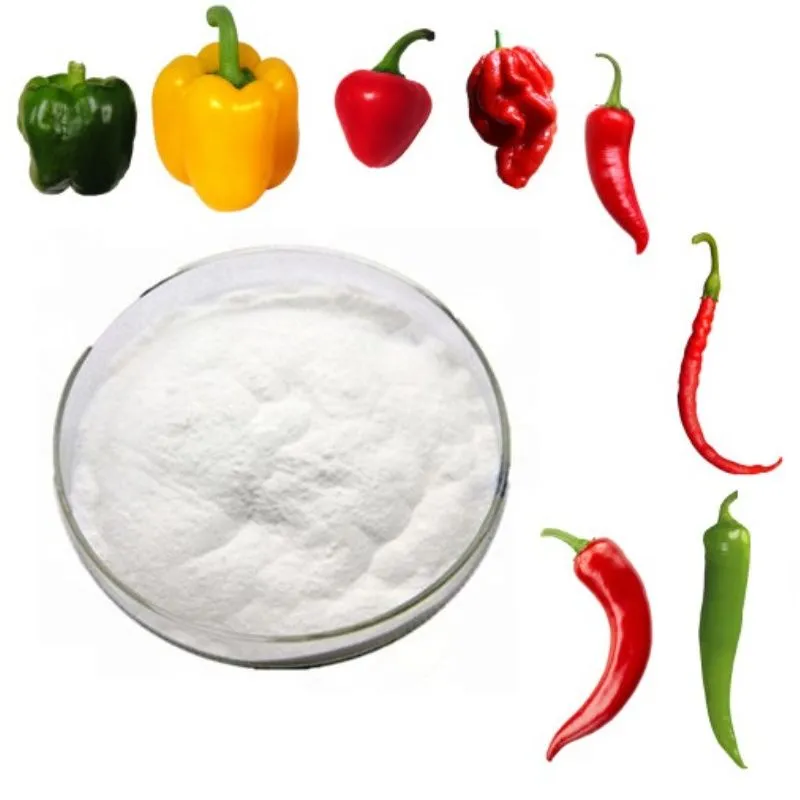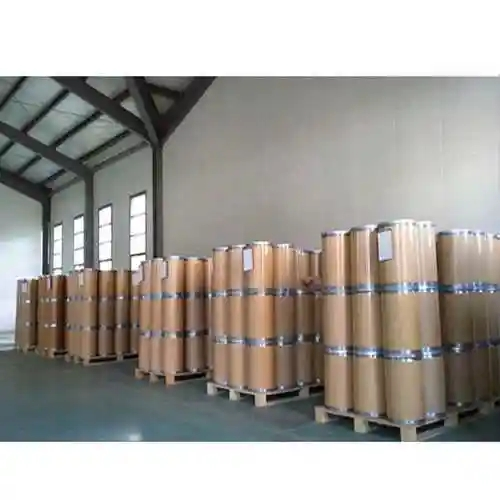White Capsaicin Powder: A Secret Ingredient in Weight Loss
In the ever-evolving world of weight loss supplements, white capsaicin powder has emerged as a potent contender. This refined extract from chili peppers has garnered attention for its potential to boost metabolism and aid in fat burning. But what exactly is white capsaicin powder, and how can it contribute to your weight loss journey? Let's delve into the science behind this spicy supplement and explore its potential benefits.
How White Capsaicin Powder Enhances Fat Burning?

White capsaicin powder is derived from the same compound that gives chili peppers their fiery kick. However, unlike its colorful counterpart, white capsaicin is purified to remove the pungent taste and color, making it more versatile for use in supplements and food products.
The fat-burning properties of capsaicin are attributed to its ability to increase thermogenesis in the body. Thermogenesis is the process by which your body generates heat, burning calories in the process. When you consume capsaicin, it triggers a cascade of physiological responses that can potentially accelerate your metabolism.
Research has shown that capsaicin can activate brown adipose tissue (BAT), also known as "brown fat." Unlike white fat, which stores excess calories, brown fat burns energy to produce heat. By stimulating BAT, capsaicin may help increase energy expenditure and promote fat oxidation.
Moreover, capsaicin has been found to influence the release of certain hormones involved in metabolism and appetite regulation. It may increase the production of norepinephrine, a hormone that plays a crucial role in fat breakdown and energy expenditure. Additionally, some studies suggest that capsaicin can help reduce appetite, potentially leading to decreased calorie intake.
Incorporating White Capsaicin Powder into Your Diet
One of the advantages of white capsaicin powder is its versatility. Unlike traditional capsaicin sources like hot peppers, which can be overpowering in taste, white capsaicin powder can be easily incorporated into various foods and beverages without significantly altering their flavor profile.
Here are some creative ways to include white capsaicin powder in your diet:
- Smoothies and Protein Shakes: Add a small amount of white capsaicin powder to your morning smoothie or post-workout protein shake for a metabolic boost.
- Salad Dressings: Mix white capsaicin powder into your homemade salad dressings for a subtle kick that may help increase satiety.
- Soups and Stews: Sprinkle a pinch of white capsaicin powder into your soups and stews to enhance their warming effect and potential fat-burning properties.
- Herbal Teas: Incorporate white capsaicin powder into your favorite herbal tea blend for a metabolism-boosting beverage.
- Seasoning Blends: Create your own seasoning mix with white capsaicin powder to sprinkle on vegetables, lean proteins, or whole grains.
It's important to note that while white capsaicin powder is generally considered safe when used in moderation, it's always advisable to start with small amounts and gradually increase your intake to assess your tolerance. Some individuals may experience mild gastrointestinal discomfort or a warming sensation when consuming capsaicin, so it's essential to listen to your body and adjust accordingly.
Does White Capsaicin Powder Really Work for Weight Loss?
The efficacy of white capsaicin powder for weight loss has been the subject of numerous scientific studies, with mixed but promising results. While it's not a magic bullet for shedding pounds, research suggests that capsaicin may offer several benefits that could contribute to weight management when combined with a balanced diet and regular exercise.
A meta-analysis published in the journal Appetite examined the effects of capsaicin on energy intake and found that it could reduce calorie consumption by about 50 calories per meal. While this may seem modest, over time, these small reductions can add up to significant calorie savings.
Another study published in the International Journal of Obesity investigated the long-term effects of capsaicin supplementation on weight management. The researchers found that participants who consumed capsaicin regularly experienced better weight maintenance after a period of weight loss compared to those who didn't take capsaicin.
It's worth noting that the effects of capsaicin on weight loss can vary among individuals. Factors such as genetics, overall diet, physical activity levels, and metabolic health can influence how your body responds to capsaicin supplementation. Additionally, some studies have suggested that the body may develop a tolerance to capsaicin over time, potentially reducing its long-term effectiveness.
While the research on white capsaicin powder specifically is limited, the compound's potential benefits for weight management are intriguing. As with any supplement, it's crucial to approach white capsaicin powder as part of a comprehensive weight loss strategy rather than a standalone solution.
Conclusion
White capsaicin powder represents an innovative approach to harnessing the potential weight loss benefits of capsaicin without the heat and color associated with chili peppers. Its ability to boost metabolism, increase thermogenesis, and potentially reduce appetite makes it an intriguing option for those looking to support their weight loss efforts.
However, it's essential to remember that no supplement can replace the foundations of a healthy lifestyle. White capsaicin powder should be viewed as a complementary tool in your weight loss journey, alongside a nutritious diet, regular physical activity, and adequate sleep.
For those interested in exploring the potential of white capsaicin powder and other plant-based extracts for weight management and overall health, Xi'an Jiubaiyuan Biotechnology Co., Ltd. offers a range of high-quality botanical extracts. To learn more about our products and how they can support your health and wellness goals, please contact us at emily@jiubaiyuanbiotech.com.

References
1. Whiting, S., Derbyshire, E., & Tiwari, B. K. (2012). Capsaicinoids and capsinoids. A potential role for weight management? A systematic review of the evidence. Appetite, 59(2), 341-348.
2. Ludy, M. J., Moore, G. E., & Mattes, R. D. (2012). The effects of capsaicin and capsiate on energy balance: critical review and meta-analyses of studies in humans. Chemical senses, 37(2), 103-121.
3. Lejeune, M. P., Kovacs, E. M., & Westerterp-Plantenga, M. S. (2003). Effect of capsaicin on substrate oxidation and weight maintenance after modest body-weight loss in human subjects. British Journal of Nutrition, 90(3), 651-659.
4. Janssens, P. L., Hursel, R., & Westerterp-Plantenga, M. S. (2014). Capsaicin increases sensation of fullness in energy balance, and decreases desire to eat after dinner in negative energy balance. Appetite, 77, 44-49.
5. Zheng, J., Zheng, S., Feng, Q., Zhang, Q., & Xiao, X. (2017). Dietary capsaicin and its anti-obesity potency: from mechanism to clinical implications. Bioscience reports, 37(3).
